 
 Main Menu
Main Menu
|
 Nevada Classics
Nevada Classics
|
 Advertise at CC
Advertise at CC
|
 February 2025
February 2025
|
| S |
M |
T |
W |
T |
F |
S |
| |
|
|
|
|
|
1 |
| 2 |
3 |
4 |
5 |
6 |
7 |
8 |
| 9 |
10 |
11 |
12 |
13 |
14 |
15 |
| 16 |
17 |
18 |
19 |
20 |
21 |
22 |
| 23 |
24 |
25 |
26 |
27 |
28 |
|
|
 CC Advertisers
CC Advertisers
|
|

06-16-2011, 07:07 PM
|
 |
CC Member

|
|
|
Join Date: May 2009
Location: American Fork,
Ut
Cobra Make, Engine: 66 Cobra
Posts: 930
|
|

 Not Ranked
Not Ranked
 Dist. Advance Re-curve
Dist. Advance Re-curve
Several months ago a friend of mine (Jeremy) and I were talking about his 67 FE engine in his Kirkham 427. One of the prettiest cars I have ever seen with just about every option. Jeremy is a fabricator for Kirkhams, so he built many of the parts for his car and I must say the man is an artist . Anyway, the conversation was about his mildly modified engine and how I though it could take advantage of modifying the advance curve in his stock distributor. This was something we did regularly back in the late 60s and 70s. Itís pretty straight forward, but if you havenít done it before can be a little confusing.
Since over the last couple of years I had read a few threads about guys doing it and asking questions I decided when we did Jeremyís I would take a lot of pictures and do a basic how to tread. I had a few members call me and ask questions so I though it would be of value to cover the basic steps here to aid others.
Last night Jeremy came over to my shop and we re-curved his distributor. Jeremy did most of the work and I talked him through the process and I took pictures. So, if you guys donít mind I will do several post with pictures on the basics of how to do it. Then since this is an open forum we may get into some discussions about theories of advance of various cammed engines and the merits of vacuum advance or not. We will see where it goes.
Wayne

|
-
Advertising


06-16-2011, 07:36 PM
|
 |
Senior Club Cobra Member

|
|
|
Join Date: Jan 2001
Location: Santa Barbara, Ca.,
ca
Cobra Make, Engine: R.U.C.C. with a 427FE, toploader
Posts: 1,435
|
|

 Not Ranked
Not Ranked
Great, I would love to see how it is done!
__________________
Mike Z
Nothing sucks more than that moment during an argument when you realize youíre wrong. 
|

06-16-2011, 08:04 PM
|
 |
CC Member

|
|
|
Join Date: May 2009
Location: American Fork,
Ut
Cobra Make, Engine: 66 Cobra
Posts: 930
|
|

 Not Ranked
Not Ranked
 The Basics
The Basics
Let me start by saying that this could be pretty long if we tried to cover all the variations from stock to highly modified engines with various advances so I will try to be brief and start will some generalities for now.
Light cars can really benefit from a quicker advance because they are carrying less weight and have less risk of pinging or detonation. Many of the old stock engines did not fully advance until the high 4k rpms. By changing the advance springs you can make your advance come in a lot quicker which improves performance as you are giving the engine more time for combustion. Generally, it is good if we can get all the advance in from 2,500 to 3,000 rpms. Mildly modified engines seem to run pretty well with around 10-12 degrees initial advance. Highly modified engines can run up the high teens of initial advance. Initial advance plus advance built into the distributor equals total advance. Initial advance aids idle quality. Let's leave vacuum advance out of it for now.
FE engines seem to run well from about 32-36 degrees total advance. SBF engines can run a little higher, and in some cases I have seen them run 41 degrees. It all depends on the cam duration, type of heads and combustion chamber design, compression ratio, and other various factors. But cam duration seems to be the biggest factor.
Since we were working on a very mildly modified FE engine with a low duration cam our target initial timing is going to be 10 degrees. We were also shooting for a total centrifical advance of 35-36 degrees. So 36-10=26 degrees that we would like to be built into our distributor. I say 26 degrees but I need to clarify that is crankshaft degrees. The distributor turns 1/2 the times of the crank shaft so that means we are looking for 13 distributor degrees.
Jeremy had purchased some Mr. Gasket Ford Springs, part number 925D, that sell from 5-10 bucks. Next post is when we get started.
Wayne

|

06-17-2011, 07:24 AM
|
 |
CC Member

|
|
|
Join Date: May 2009
Location: American Fork,
Ut
Cobra Make, Engine: 66 Cobra
Posts: 930
|
|

 Not Ranked
Not Ranked
 Removing the Points Plate
Removing the Points Plate
In the old days we used to re-curve distributors on a Sun Distributor machine, which made it a little easier, but it can be done on the engine without too much trouble.
The first thing we did was cover the car fenders to avoid damage. Ya, pretty obvious but sometimes you get in a hurry to get to a problem. The next thing Jeremy did was remove the distributor cap with the wires attached and moved it out of the way. Now take a look at where the rotor is pointing. Mark exactly where it is pointing on the engine with chalk or something. Jeremyís was pointing directly at the top of his temp sensor so we didnít have to mark anything. Now if you are not familiar with your points distributor take a minute to look at it to familiarize yourself. It may be a good idea to take a picture of it straight down from the top.
The goal is to remove the points plate so we can get down to the advance mechanism underneath. I want to point out that the distributor has to come out either now or later if you have to rotate the advance limiter. If you take it out itís easier to put it in a vise to hold it to remove the dist. cam retainer clip. Or, you can leave it in until you are all done and then lift the dist. enough to rotate it 180 degrees. You will see what I am talking about later. We left it in to change the advance.
Remove the rotor. Remove the wire from the coil and pull it through the inside of the distributor housing. You can remove the points but you donít need to. If you have vacuum advance remove that small clip on the vacuum advance arm. Ours was missing but it stays on without it. Remove the two screws holding the vacuum advance canister. Yes, they are long screws. You can test the canister with a vacuum pump or simply sucking on the hose fitting and then put your tongue on it to hold the vacuum. If it wonít hold in itís bad. Now remove the two outer screws on the edge of the plate. One of them the ground wire goes to. You can now lift the plate up and over the dist. cam to remove it.

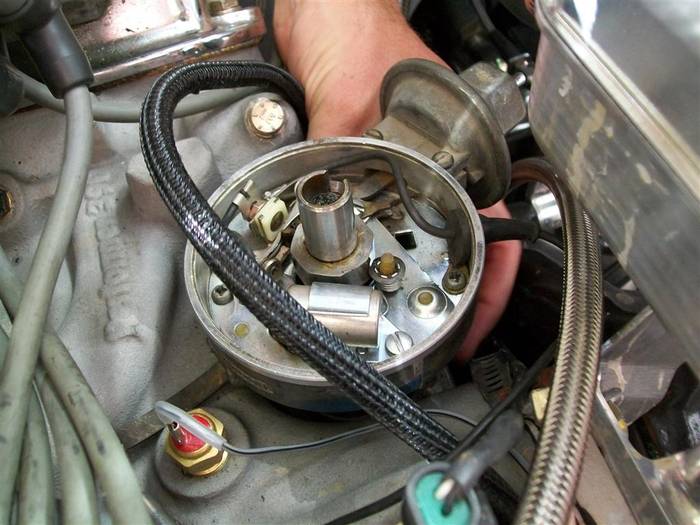
There is problem with this after market points plate in this picture. Do you see it? We will talk about it later.
Wayne
Last edited by Wbulk; 06-25-2011 at 05:35 PM..
Reason: Added Picture
|

06-17-2011, 11:33 AM
|
 |
CC Member

|
|
|
Join Date: May 2009
Location: American Fork,
Ut
Cobra Make, Engine: 66 Cobra
Posts: 930
|
|

 Not Ranked
Not Ranked
 Removing the Dist. Cam/ Advance Limiter
Removing the Dist. Cam/ Advance Limiter
With the points plate removed you can now see the advance mechanism with the weights, springs, and stops. Notice in the picture below the one heavy spring. Thatís what keeps the total advance from coming in until the high 4k range. Also notice that there are two optional slots that control the mechanical advance. One is marked 18L and the other is 13L. Those are the degrees for the stop that comes up with the piece of rubber on it. There are other advance slots ranging from 8L on up depending on what engine you have. We need to take this cam/advance stop out and rotate it 180 degrees so the stop is on the 13L side. Remember 2x13=26 cranks degree plus 10 degrees initial timing for the total of 36 degrees. We will later have to lift the dist. and rotate it 180 degrees.
To remove the cam/advance limiter, take a big needle or something sharp and in the top of the shaft were the rotor goes look down in the hole. There should be a piece of felt. Remove it. By the way this is a neglected area. You are supposed to add some oil to the felt every so often to lubricate the advance mechanism. They get rusty and seize up, and then you wonít have any advance. Under the felt is the wire clip. It can be a bugger to get out. I use a really small set of needle nose pliers and small screw driver. Itís not easy but donít force it. I think it took Jeremy about 10 minutes. I have a picture of the clip and some felts in the round try.
You then just remove the springs and lift the cam out. Jeremy then lubed the distributor shaft that the cam slides onto with some light white grease. Donít use heavy grease or it can hinder the advance. Then he installed the cam back in with the stop on the 13L side and then installed the new springs, the clip, and felt that goes in the end of the shaft.
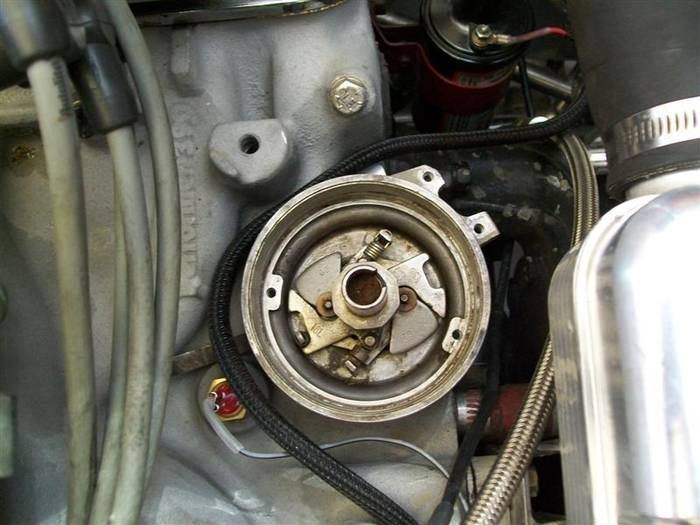
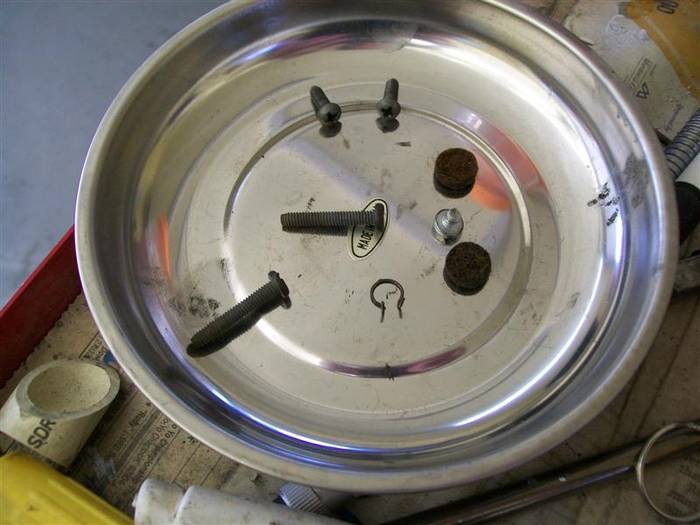
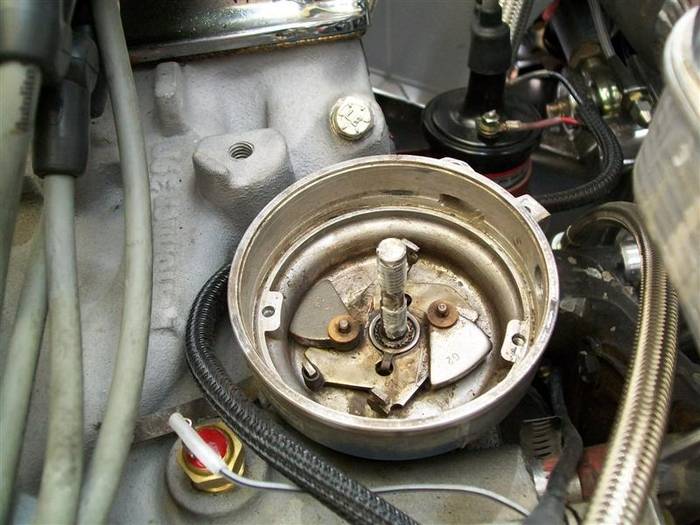
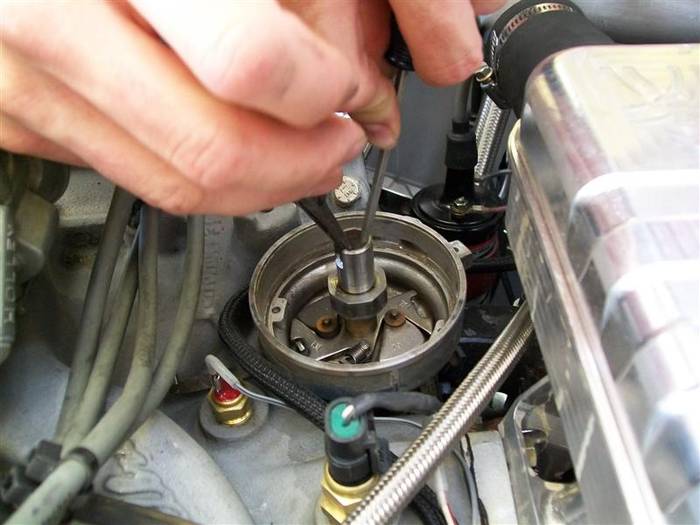
Last edited by Wbulk; 06-25-2011 at 05:52 PM..
|

06-17-2011, 12:13 PM
|
 |
CC Member

|
|
|
Join Date: May 2009
Location: American Fork,
Ut
Cobra Make, Engine: 66 Cobra
Posts: 930
|
|

 Not Ranked
Not Ranked
 Breaker Plate Problem
Breaker Plate Problem
Jeremy then installed the points plate. I then turned the rotor and let it go and tried to turn it further in the direction of the return. It should not turn and should be solid against the stop inside. But we had a problem, I could turn it further by hand than it was returning by the springs. The springs should always be able to return it to the stop. In some cases I have heard of the springs being too light. In this case we found that we had an after market points plate that was poorly designed. The cam was hitting a tension retainer clip on the points plate. It was also hitting a spring clip on the bottom of the cam. This can be seen in the first picture but we didn't notice it until we stated checking the return on the springs.
Jeremy took the points plate back off and we could see where this had been rubbing for years. The timing was never close to being right on this engine with this plate installed. It most likely was erratic. Jeremy said it actually died on him early. He took the cap off, moved a few things and it started again.
I just happened to have the old stock dist. out of my car that was all apart.  The shaft was worn to bad to use so I had bought a new billet dist. I took my old points plate, cleaned it up, and we installed that.
The factoy points plate on the left. After market on the right. You can see the clip and spring in the lower center of the after market plate that was rubbing.
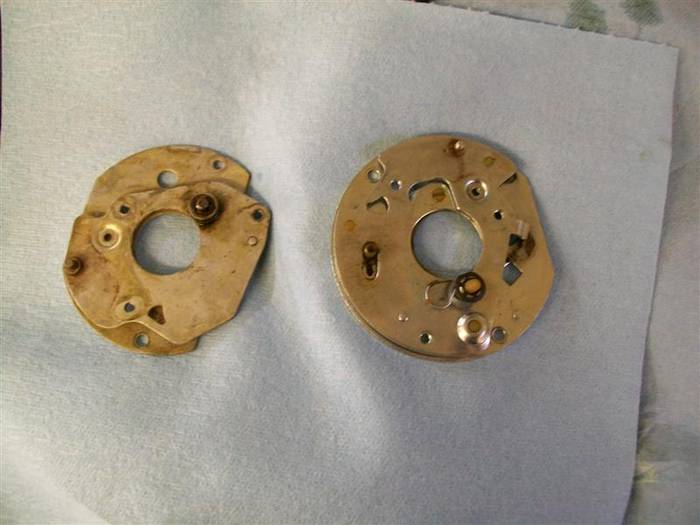
Last edited by Wbulk; 06-17-2011 at 12:16 PM..
Reason: Pictures Added
|

06-17-2011, 12:43 PM
|
 |
CC Member

|
|
|
Join Date: May 2009
Location: American Fork,
Ut
Cobra Make, Engine: 66 Cobra
Posts: 930
|
|

 Not Ranked
Not Ranked
 Removing the Dist.
Removing the Dist.
We still needed to pull the distributor since we rotated the dist. cam 180 degrees. Jeremy removed the distributor bolt and hold down. I marked the base of the dist. right where it goes into the block with a fine paint marker and then marked the same point on the block. This would allow us to get an in the ball park timing reference point and start the engine easier.
Jeremy pulley the dist. but it took awhile. That bugger just would not come out. Then finally after a lot of moving it back and forth and up and down it started to come out. When you pull it out I have found that if you keep pressure on the rotor in the direction it is coming out you can feel the point where it clears the cam teeth. When you are putting it in then you can drop it in with the rotor at that point and as it goes in it rotates to where it needs to be. Jeremy installed the dist. with the 180 degrees from where it was. It took a fair amount of playing with it to get it to drop all the way in and engage the oil pump drive shaft. He then lined up the two marks I made and bolted in down, but not tight.
Last edited by Wbulk; 06-18-2011 at 05:38 AM..
Reason: fix
|

06-17-2011, 01:04 PM
|
|
CC Member / Sponsor

|
|
|
Join Date: Jan 2002
Location: Provo,
UT
Cobra Make, Engine: HiTech Legends GT500
Posts: 1,359
|
|

 Not Ranked
Not Ranked
 Watch our for the bugs
Watch our for the bugs
Quote:
Originally Posted by Wbulk

You can test the canister with a vacuum pump or simply sucking on the hose fitting and then put you tongue on it to hold the vacuum. If it won’t hold in it’s bad.
Wayne
|
From the school of hard knocks...
Be careful, I sucked up a bug doing this. YUK  My suggestion, if using the poor boy method, is to blow first, then suck. Putting a piece of cloth (your shirt will work) between the tube and your mouth is a good idea also. |

06-17-2011, 01:16 PM
|
 |
CC Member

|
|
|
Join Date: May 2009
Location: American Fork,
Ut
Cobra Make, Engine: 66 Cobra
Posts: 930
|
|

 Not Ranked
Not Ranked
 Setting the Timing
Setting the Timing
Jeremy bumped the starter over so the timing marks on the crank dampener were close. He then put it in gear and we rolled the car forward a little to get it perfect so we could see the marks. I cleaned the marks off with a 3M pad and Marked 0, 10, and 36 degrees with my fine paint marker. Timing is always set with vacuum advance disconnected.
Jeremy then started the engine and the timing was close. He then ran the rpms up to about 3,100 rpms as I watched the timing marks. This is where it stopped advancing so we knew the springs were about right. This part is easier for two guys to do; one watching the timing and the other working the throttle and watching the tach. We then ran it up past 3100 rpms and set the timing at 36 degrees for total advance. We then let it idle and checked the timing to see where it ended up. Interesting, it ended up at 7 degrees advance. This would mean that the 13L slot was not exact and or the rubber cushion on the stop was worn or shrunk. So we ended up 3 degrees off from what we wanted for initial timing but total was what we wanted.
If we were dead set on 10 degrees initial timing our options are to put a thicker piece of rubber hose on the advance stop arm or to weld up the advance stop side of the 13L slot. What you are trying to do is reduce the movement within that slot. I have never used a thinker rubber hose, but it seems like a reasonable idea. In the end I gave my old dist. cam to Jeremy so he could weld up the slot and grind it just right. It’s just a slight amount as it’s just 3 crank degrees or 1 Ĺ dist. degrees. 
Last edited by Wbulk; 06-17-2011 at 06:32 PM..
Reason: fix
|

06-17-2011, 01:19 PM
|
 |
CC Member

|
|
|
Join Date: May 2009
Location: American Fork,
Ut
Cobra Make, Engine: 66 Cobra
Posts: 930
|
|

 Not Ranked
Not Ranked
Thanks Tom. I had a vacuum pump gauge but I was to lazy to get it out. To easy to suck on it.
Wayne
|

06-17-2011, 01:35 PM
|
 |
CC Member

|
|
|
Join Date: May 2009
Location: American Fork,
Ut
Cobra Make, Engine: 66 Cobra
Posts: 930
|
|

 Not Ranked
Not Ranked
 Vacuum Advance
Vacuum Advance
The next thing we checked was the vacuum advance. With the car at idle I plugged the vacuum advance hose to manifold vacuum and checked the timing. It was about 35-37 degrees total. So minus the 7 degrees initial, we had a whopping 28-30 degrees of vacuum advance. This could be a problem and I would not recommend more than about 15 to avoid pinging at cruise. This vacuum canister had an octagon end on it, which I had found in the past to be adjustable. I stuck an allen wrench in the vacuum hole but could not find the screw to turn the advance down. My wrench may have not been long enough. In the end Jeremy may end up buying a new adjustable vacuum canister.
Wayne
|

06-17-2011, 01:55 PM
|
 |
CC Member

|
|
|
Join Date: May 2009
Location: American Fork,
Ut
Cobra Make, Engine: 66 Cobra
Posts: 930
|
|

 Not Ranked
Not Ranked
 To Vacuum Advance or Not
To Vacuum Advance or Not
I am biased on this subject. I say if the car is driven on the street have a vacuum advance. On race cars vacuum advance has little value since they are running at full throttle much of the time where vacuum is low anyway. Vacuum advance on a street car has the advantage of improving mileage and can be used as an aid to improving idle on big cammed engines. Take for example an engine with a radical cam with a lot of duration and valve overlap. The idle can be a real problem, and for some you have to idle it at 1300 rpms or higher and sometimes get the throttle blades into the idle transfer circuit. However, if you have vacuum advance you can hook it to manifold vacuum, which gives more time to burn that un-burnt fuel and it greatly improves idle. I think it's a win win for cars driven on the street.
|

06-17-2011, 02:08 PM
|
 |
CC Member

|
|
|
Join Date: May 2009
Location: American Fork,
Ut
Cobra Make, Engine: 66 Cobra
Posts: 930
|
|

 Not Ranked
Not Ranked
 The Test Drive
The Test Drive
It was a beautiful night for a ride. We drove the car for about five miles. Jeremy said the car ran a lot smoother and it revved up a lot quicker. When he would get on it he had this big grin on his face. My grin never stopped. Just riding in the car was a blast. Good times!! This distributor had been messed up since he finished his car. It was worth it for a few hours of work and a few bucks for the springs.
Next project adjusting his carb.
The End
Wayne
Last edited by Wbulk; 06-17-2011 at 02:15 PM..
|

06-17-2011, 06:29 PM
|
 |
CC Member

|
|
|
Join Date: May 2009
Location: American Fork,
Ut
Cobra Make, Engine: 66 Cobra
Posts: 930
|
|

 Not Ranked
Not Ranked
A few other points of interest.
This same process works for the Dura-spark distributor but you pry on the the reluctor to get it off. Don't pry on the teeth, but on the main body part, with two large screw drivers. You also need to mark the reluctor with the shaft because there are two grooves for the roll pin.
The width of the commonly used advance slots are as follows.
8L or 16 deg. .358
9L or 18 deg. .384
10L or 20 deg. .410
11L or 22 deg. .436
12L or 24 deg. .462
13L or 26 deg. .488
14L or 28 deg. .514
These seem the be in the pall park since it's not a machined part.
Last edited by Wbulk; 06-17-2011 at 06:54 PM..
|

06-17-2011, 07:47 PM
|
 |
Senior Club Cobra Member

|
|
|
Join Date: Jan 2001
Location: Santa Barbara, Ca.,
ca
Cobra Make, Engine: R.U.C.C. with a 427FE, toploader
Posts: 1,435
|
|

 Not Ranked
Not Ranked
Thank you for sharing your insight.
__________________
Mike Z
Nothing sucks more than that moment during an argument when you realize youíre wrong. 
|

06-17-2011, 07:54 PM
|
 |
CC Member

|
|
|
Join Date: May 2009
Location: American Fork,
Ut
Cobra Make, Engine: 66 Cobra
Posts: 930
|
|

 Not Ranked
Not Ranked
Thanks Mike. I just hope I made it clear enough for those that want to do it.
Wayne
|

06-17-2011, 08:46 PM
|
|
CC Member

|
|
|
Join Date: May 2006
Location: St. Louisville,
Oh
Cobra Make, Engine: A&C 67 427 cobra SB
Posts: 2,445
|
|

 Not Ranked
Not Ranked
Great write up and thanks for taking the time.
I disagree with one thing stated, and I have heard others state the same thing as well. I disagree that the engine can run more timing because the car is lighter. At WOT, the timing needs to be correct for the engine to make maximum power. On a given engine, the biggest factor affecting where the timing should be is air fuel ratio. It may be true you can run more timing on a lighter car without pinging, but the car weight does not change what timing is needed to produce the most power.
If it were true that the engine needed more timing in a lighter car to make the most power then the timing should be set higher in first gear than it is in second gear. Each gear the timing should be reduced as you shift.
|

06-17-2011, 10:05 PM
|
 |
CC Member

|
|
|
Join Date: May 2009
Location: American Fork,
Ut
Cobra Make, Engine: 66 Cobra
Posts: 930
|
|

 Not Ranked
Not Ranked
I do not disagree with you. I have always been taught that you get the timing in the ballpark and then work on air fuel ratio. I think maybe it's because it's more stable or simple for lack of a better term, as compared to the carb that has several circuits and is somewhat primitive and dependent on various factors such as driving conditions and such, not to mention octane or ethanhol mixed fuels. I think after the basics are set going back and forth between the two is key to fine tuning. It's doing the hard way what car computers do in Mila seconds. I wonder why we spend so much time trying to make these primitive carbs act like something they can never be. It must be the challenge, you think.
Last edited by Wbulk; 06-17-2011 at 10:21 PM..
|

06-17-2011, 10:49 PM
|
 |
CC Member

|
|
|
Join Date: May 2001
Location: California,
Ca
Cobra Make, Engine: NAF 289 Slabside Early Comp Car with 289 Webers and all the goodies. Cancelling the efforts of several Priuses
Posts: 6,592
|
|

 Not Ranked
Not Ranked
Nice in depth explanation Wayne, good job!
One other point which some may want to take advantage of, the larger Ford Duraspark Cap can be adapted to any of the point type ot 1st generation Duraspark Distributors by using the cap adapter and required rotor, or the small diameter cap with the male high tension terminals from an AMC or International application will fit also. Such as this (although this is for a Small Block):
[IMG] 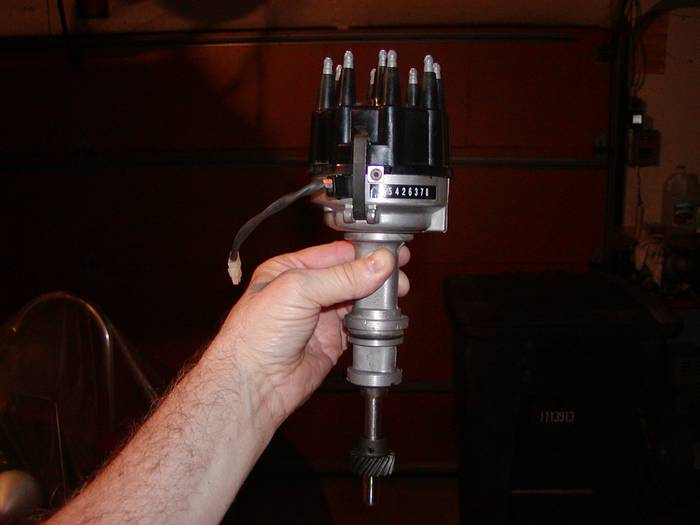 [/IMG]
__________________
Rick
As you slide down the Banister of Life, may the splinters never be pointing the wrong way 
Last edited by Rick Parker; 06-17-2011 at 10:52 PM..
|

06-18-2011, 07:45 AM
|
|
Senior Club Cobra Member

|
|
|
Join Date: Jul 2000
Location: Las Vegas,
NV
Cobra Make, Engine: ERA 427 SO
Posts: 1,126
|
|

 Not Ranked
Not Ranked
Wayne, good writeup! I've been doing this for years, and still found this accurate and interesting.
Old Dog, I don't think Wayne is saying that lighter cars can take more timing...he said FE's work best with 34-36 degrees, so total timing, for power, would not change with the car weight; what he is saying (and I really don't know the answer) is that a given engine in a lighter car can take more timing earlier in the RPM range (under 3000 RPM or so) without causing pinging or detonation, as compared to that same engine in a heavier car, yet still need the same max advance for peak power (5-7K RPM) in either car.
Great thread, and good tip from Tom on bug-sucking.
__________________
Ken
|
 Posting Rules
Posting Rules
|
You may not post new threads
You may not post replies
You may not post attachments
You may not edit your posts
HTML code is Off
|
|
|
All times are GMT -7. The time now is 10:24 PM.
|


























 The shaft was worn to bad to use so I had bought a new billet dist. I took my old points plate, cleaned it up, and we installed that.
The shaft was worn to bad to use so I had bought a new billet dist. I took my old points plate, cleaned it up, and we installed that. 

 My suggestion, if using the poor boy method, is to blow first, then suck. Putting a piece of cloth (your shirt will work) between the tube and your mouth is a good idea also.
My suggestion, if using the poor boy method, is to blow first, then suck. Putting a piece of cloth (your shirt will work) between the tube and your mouth is a good idea also. Linear Mode
Linear Mode



